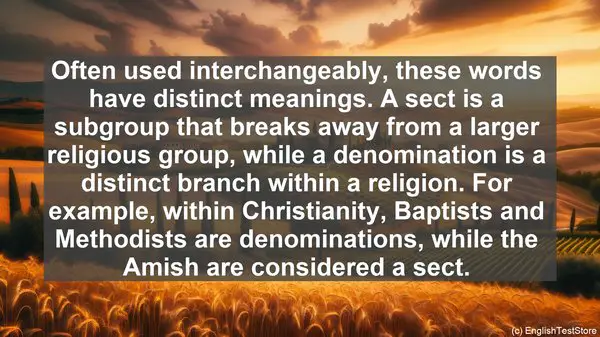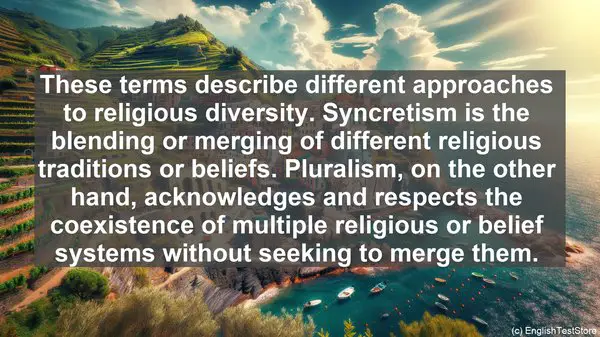Introduction
Welcome to our Comparative Religion class. Today, we’re going to dive into the world of commonly confused words. Understanding these terms is crucial for a comprehensive grasp of the subject. So, let’s get started!
1. Sect vs. Denomination
Often used interchangeably, these words have distinct meanings. A sect is a subgroup that breaks away from a larger religious group, while a denomination is a distinct branch within a religion. For example, within Christianity, Baptists and Methodists are denominations, while the Amish are considered a sect.
2. Monotheism vs. Polytheism
These terms refer to the number of deities in a religion. Monotheism believes in a single god, like in Judaism or Islam, while polytheism acknowledges multiple gods, as seen in Hinduism or ancient Greek religion.
3. Atheism vs. Agnosticism
Both terms relate to belief in a higher power. Atheism is the absence of belief in any god, while agnosticism is the belief that the existence of a god is unknown or unknowable. An atheist denies the existence of a god, while an agnostic remains uncertain.
4. Ritual vs. Ceremony
While both involve a series of actions, rituals are often symbolic and repeated, while ceremonies are more formal and usually mark a significant event. For example, a wedding is a ceremony, while the daily prayer routine in some religions is a ritual.

5. Sacred vs. Profane
These terms describe the distinction between what is considered holy or set apart (sacred) and what is ordinary or secular (profane). Sacred objects, places, or texts hold special religious significance, while profane refers to the everyday, non-religious aspects of life.

6. Dogma vs. Doctrine
Both terms refer to a set of beliefs, but there’s a subtle difference. Dogma is a principle or tenet that is considered authoritative and unchangeable, often associated with a specific religion. Doctrine, on the other hand, is a broader term that encompasses the teachings and beliefs of a religious group.
7. Pantheism vs. Panentheism
These terms describe the relationship between the divine and the world. Pantheism sees the divine as identical to the universe, while panentheism believes that the divine is present and interpenetrates every part of the world, but also transcends it.
8. Exegesis vs. Eisegesis
These terms are often used in the context of interpreting religious texts. Exegesis is the careful analysis and interpretation of a text, aiming to understand its original meaning. Eisegesis, on the other hand, is the interpretation of a text based on one’s preconceived notions or personal beliefs.
9. Eschatology vs. Apocalypticism
Both terms deal with the study of the end times, but there’s a distinction. Eschatology is a broader field that examines the concept of the end of the world or the ultimate destiny of humanity. Apocalypticism, however, focuses specifically on the belief in a cataclysmic event that will bring about a new age.
10. Syncretism vs. Pluralism
These terms describe different approaches to religious diversity. Syncretism is the blending or merging of different religious traditions or beliefs. Pluralism, on the other hand, acknowledges and respects the coexistence of multiple religious or belief systems without seeking to merge them.
